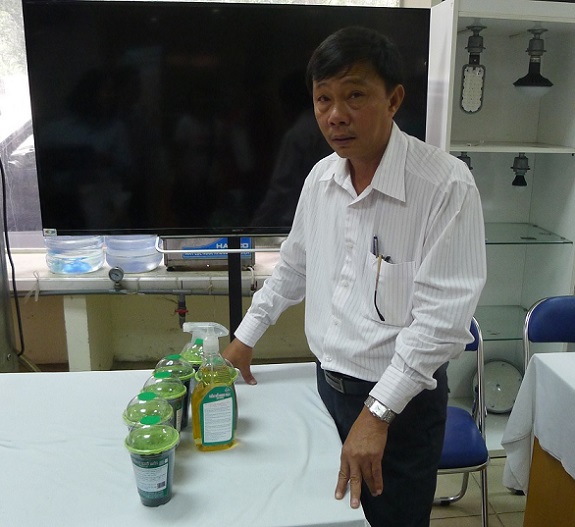
Wood vinegar, or Pyroligneous acid, has long-term effects and no negative impact on the environment.
 |
Wood vinegar, or Pyroligneous acid, has long-term effects and no negative impact on the environment.
CESTI (the Center for Science and Technology Information) recently announced the successful production of wood vinegar, a new product of Vietnam which can be used as a medicinal herb in organic agriculture. The product was developed by TARCC (Tropical Agricultural Research and Consultancy Center) and BIFFA, a fertilizer company.
Wood vinegar is a liquid produced by the destructive distillation of wood and other plant materials. It is a by-product collected from the anaerobic pyrolysis of wood, containing many organic compounds such as alcohols, esters, acids, phenols and aldehydes. The most abundant component is acetic acid, accounting for about 3-5 percent.
According to Vu Thi Quyen from TARCC, if the correct amount of wood vinegar is used, it will help stimulate germination and support root development. In high concentrations, wood vinegar will inhibit germination which helps limit the growth of weeds.
The made-in-Vietnam wood vinegar developed by TARCC and BIFFA has been tried at many units, including the HCMC Ornamental Flora Research Service Center and cooperatives in Hai Duong, Hai Phong and Bac Giang.
After two weeks of trial use, farmers found that the wood vinegar not only helped significantly reduce the mildew on bitter melon, but also helped the trees bear more fruits with equal quality.
The experiments on other vegetable varieties such as rau muong (Vietnamese spinach) and dragon fruit also showed desired effects. Besides, the vinegar also helped keep the environment clean.
BIFFA’s director said the company and TARCC are continuing testing the product on other plants to assess the effectiveness and find reasonable concentrations before the product is commercialized.
Nguyen Lan Hung, a leading agriculture expert, said the wood vinegar is very effective, saying that producers should add value to the product by applying it to valuable plant varieties.
Hung commented that the functions of cleaning the environment, driving insects away and killing harmful creatures will satisfy the needs of the majority of farmers. If commercialized, the product will bring practical benefits to farmers as well as the community.
Many countries have studied the applications of wood vinegar, especially in agricultural production. Japan leads the field with the number of inventions, accounting for 52% of the world’s patents. The Japanese government used wood vinegar in solving environmental problems after the 2011 tsunami.
(Source: VNN)





